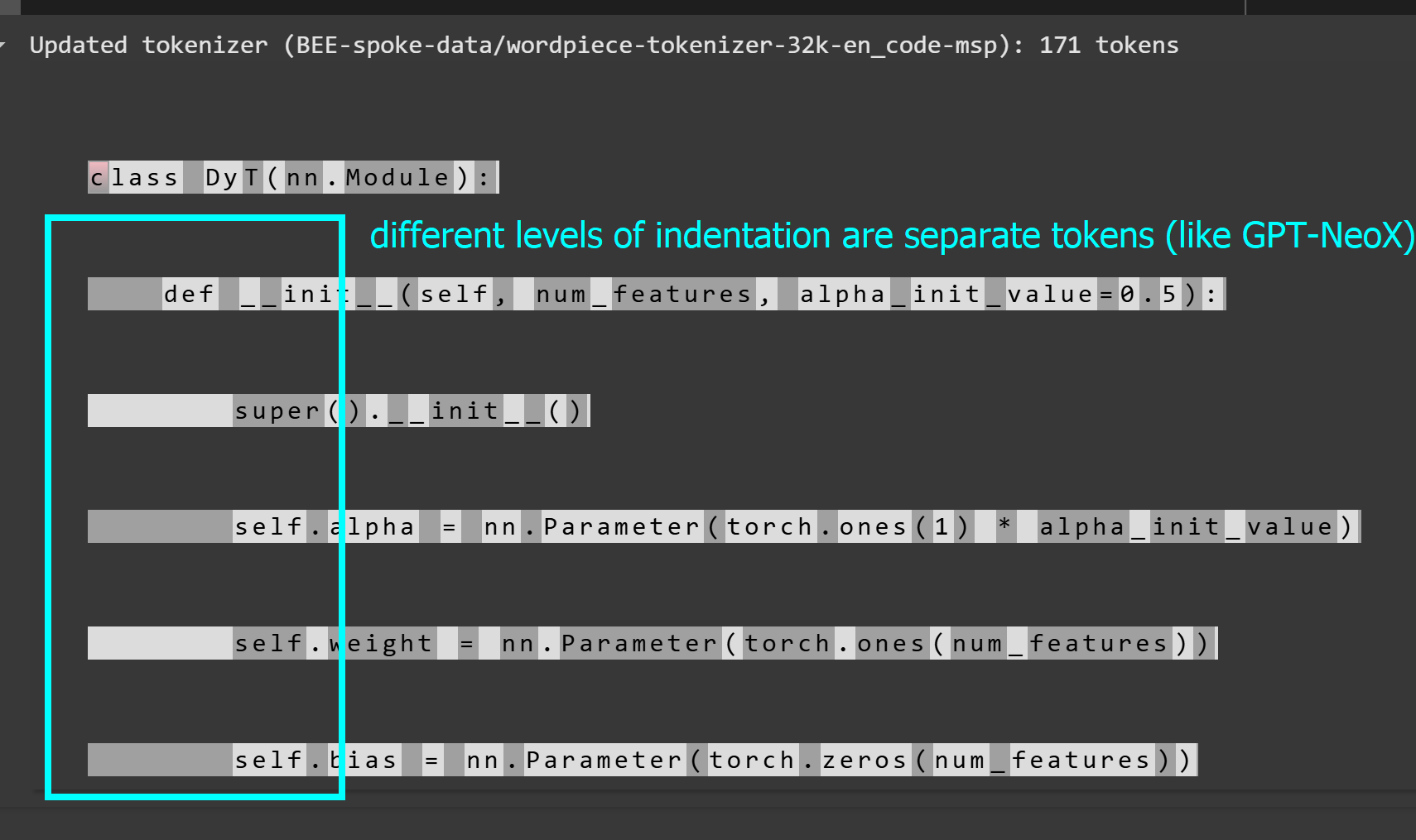File size: 3,920 Bytes
5beb453 f8128ef ee8c40e 5beb453 f8128ef 5beb453 f8128ef 5beb453 1d63520 6654938 f7f0f31 5beb453 f8128ef 5beb453 f8128ef 5beb453 1d63520 f8128ef 1d63520 66413fd 1d63520 f7f0f31 1d63520 66413fd |
1 2 3 4 5 6 7 8 9 10 11 12 13 14 15 16 17 18 19 20 21 22 23 24 25 26 27 28 29 30 31 32 33 34 35 36 37 38 39 40 41 42 43 44 45 46 47 48 49 50 51 52 53 54 55 56 57 58 59 60 61 62 63 64 65 66 67 68 69 70 71 72 73 74 75 76 77 78 79 80 81 82 83 84 85 86 87 88 89 90 91 92 93 94 95 96 97 98 99 100 101 102 103 104 105 106 107 108 109 110 111 112 113 114 115 116 117 118 119 120 |
---
library_name: transformers
license: apache-2.0
datasets:
- pints-ai/Expository-Prose-V1
language:
- en
inference: false
---
# wordpiece-tokenizer-32k-en_code-msp
A 'modern' uncased wordpiece tokenizer for MLM, analogous to `bert-base-uncased`'s tokenizer.
- 32k vocab size, uncased. Trained with max alphabet of 1000 and min_freq of 5
- Unique WordPiece tokenizer that preserves whitespace information.
- Done through ~~witchcraft~~ a combination of `Metaspace()` and custom grouping/filtering logic
- trained on english/code via `pints-ai/Expository-Prose-V1` to leverage ^
## Usage
```py
from transformers import AutoTokenizer
repo_id = "BEE-spoke-data/wordpiece-tokenizer-32k-en_code-msp"
tokenizer = AutoTokenizer.from_pretrained(repo_id)
# same usage as any other tokenizer for encoder models
```
## Comparison vs bert-base-uncased
### vocab
<details>
<summary>Click to see comparison code</summary>
Code to run the below comparison:
```py
import random
from transformers import AutoTokenizer
tk_base = AutoTokenizer.from_pretrained("bert-base-uncased")
tk_retrained = AutoTokenizer.from_pretrained("BEE-spoke-data/wordpiece-tokenizer-32k-en_code-msp")
# Get vocabularies as sets
vocab_base = set(tk_base.get_vocab().keys())
vocab_retrained = set(tk_retrained.get_vocab().keys())
# Compare vocabularies
common_tokens = vocab_base.intersection(vocab_retrained)
unique_to_base = vocab_base.difference(vocab_retrained)
unique_to_retrained = vocab_retrained.difference(vocab_base)
# Print results
print(f"Total tokens in base tokenizer: {len(vocab_base)}")
print(f"Total tokens in retrained tokenizer: {len(vocab_retrained)}")
print(f"Number of common tokens: {len(common_tokens)}")
print(f"Tokens unique to base tokenizer: {len(unique_to_base)}")
print(f"Tokens unique to retrained tokenizer: {len(unique_to_retrained)}")
# Optionally print a few examples
print("\nExamples of common tokens:", random.sample(list(common_tokens), k=10))
print("\nExamples of tokens unique to base:", random.sample(list(unique_to_base), k=20))
print(
"\nExamples of tokens unique to retrained:",
random.sample(list(unique_to_retrained), k=20)
)
```
</details>
```
Total tokens in base tokenizer: 30522
Total tokens in retrained tokenizer: 31999
Number of common tokens: 19481
Tokens unique to base tokenizer: 11041
Tokens unique to retrained tokenizer: 12518
Examples of common tokens:
['mayo', 'halo', 'tad', 'isles', '##hy', 'molecular', '##43', '##へ', 'mike', 'reaction']
Examples of tokens unique to base:
['##ingdon', 'vikram', '##worm', '##mobile', 'saxophonist', 'azerbaijani', 'flared', 'picasso', 'modernized', 'brothel', '##cytes', '[unused933]', 'humming', 'pontiac', '##ła', 'wembley', '14th', '##runa', '##eum', '劉']
Examples of tokens unique to retrained:
['discrimin', '##emporal', 'tabern', 'mund', '##jud', 'schrodinger', '##oscope', 'resp', '##imento', '▁▁▁▁▁▁▁▁▁▁▁▁▁▁▁', 'caterpillar', '##374', '##endentry', 'undoubted', 'subpro', 'indispensable', '##ushed', '##sein', 'utterance', 'disambigu']
```
### whitespace encoding
Let's say we want to tokenize the below class:
```py
class DyT(nn.Module):
def __init__(self, num_features, alpha_init_value=0.5):
super().__init__()
self.alpha = nn.Parameter(torch.ones(1) * alpha_init_value)
self.weight = nn.Parameter(torch.ones(num_features))
self.bias = nn.Parameter(torch.zeros(num_features))
def forward(self, x):
x = torch.tanh(self.alpha * x)
return x * self.weight + self.bias
```
`bert-base-uncased` ignores the indentations for python, while our tokenizer does not:

this tokenizer:

|